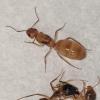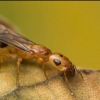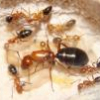- Formiculture.com
- Forums
- Gallery
- Members
- Member Map
- Chat

Diapause or not at Camponotus Japonicus
Started By
ant007
, Oct 6 2019 2:36 AM
diapause camponotus honey
4 replies to this topic
#1
 Offline
-
Posted October 6 2019 - 2:36 AM
Offline
-
Posted October 6 2019 - 2:36 AM
Your opinion, please ?.
Received September 10 Two test tubes with a colony Camponotus Japonicus. In one there were 3 workers, in the second 7. Ate syrup, larvae of Ulomoides dermestoides. September 20 gave honey. Ate a large amount.
The colony with 7 workers froze. It grouped around the queen and stopped eating. I thought it was diapause! Lowered the temperature to +15 degrees and left alone.
In another colony, two workers died and the queen ate an egg-laying; I dropped the test tube !!!! I decided to transplant one ant from another colony .. the queen is one, eats yogurt, syrup, cottage cheese
I looked into the test tube “in diapause”, the queen on the eggs. !! Put in a thermostat +25 and gave a yolk with honey.
Your opinion??
#2
 Offline
-
Posted October 6 2019 - 7:19 AM
Offline
-
Posted October 6 2019 - 7:19 AM
I don't think they do, though it would be helpful to lower the temperature for a few months, but not by too much
- ant007 likes this
My journals:
Polyergus Mexicanus: https://www.formicul...gs/#entry175528
Lasius minutus: https://www.formicul...cs/#entry174811
Lasius latipes: https://www.formicul...gs/#entry206449
General acanthomyops journal: https://www.formicul...yops-with-eggs/
Polyergus Mexicanus: https://www.formicul...gs/#entry175528
Lasius minutus: https://www.formicul...cs/#entry174811
Lasius latipes: https://www.formicul...gs/#entry206449
General acanthomyops journal: https://www.formicul...yops-with-eggs/
#3
 Offline
-
Posted October 6 2019 - 8:42 AM
Offline
-
Posted October 6 2019 - 8:42 AM
Assuming the colony came from Japan, Korea, or anywhere of similar climate/latitude, then yes, they'll need a period of diapause. From what I understand, you lowered a colony's temperature to 15C and the queen continued to lay eggs. If this is the case, they may need to be lower than 15C or they aren't quite ready for diapause yet.
- ant007 likes this
#4
 Offline
-
Posted October 8 2019 - 4:09 AM
Offline
-
Posted October 8 2019 - 4:09 AM
Diapause is a reaction to stressful external factors, when any activity threatens to weaken the strength of the colony. My mistake was to give pure honey in an unlimited amount, causing "Energetic Overheating" - the queen's fading, transmitted to the working ants.
Japanese Camponotus does not need wintering, but it is very capricious and falls into diapause. I inadvertently provoked the colony to overheat. But lowering the temperature I corrected the error. Two weeks were enough for the colony to go out of stress to the working state and the queen began laying.
#5
 Offline
-
Posted October 8 2019 - 4:10 AM
Offline
-
Posted October 8 2019 - 4:10 AM
Assuming the colony came from Japan, Korea, or anywhere of similar climate/latitude, then yes, they'll need a period of diapause. From what I understand, you lowered a colony's temperature to 15C and the queen continued to lay eggs. If this is the case, they may need to be lower than 15C or they aren't quite ready for diapause yet.
Also tagged with one or more of these keywords: diapause, camponotus, honey
 |
Market Place →
General Market Place →
Georgia - All must go!Started by sanlefa , Apr 9 2025 |
|

|
|
 |
Anting →
Ant ID Requests →
Camponotus ID North TexasStarted by AntsTx , Mar 15 2025 |
|

|
|
Anting →
Ant ID Requests →
Camponotus ID, Whitney TXStarted by AntsTx , Feb 3 2025 |
|

|
||
Ants & Myrmecology →
General →
Best THA Decor Style for Camponotus pennsylvanicusStarted by AntsTx , Nov 27 2024 |
|

|
||
 |
Ant Keeping →
Ant Keeping Journals →
Woodland Giants (Camponotus Ca-02)Started by AntsGodzilla , Nov 16 2024 |
|

|
1 user(s) are reading this topic
0 members, 1 guests, 0 anonymous users
















